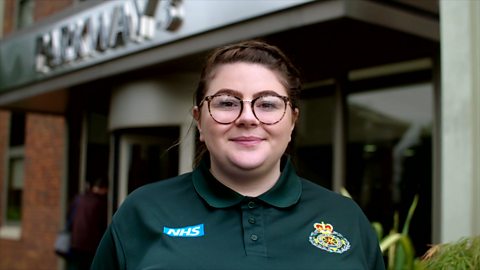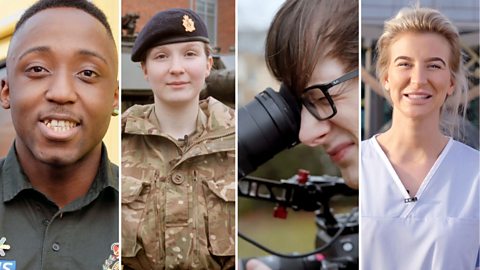Meet Hassan, 25, from Lancashire. He is a sonographer at Royal Blackburn Hospital.
Part of our Bitesize world of work series.
Knowing you've made a difference to someone's life is the ultimate career satisfaction and goal.
Hiya. My name's Hassan and I'm a sonographer.
(to patient) So I'm going to be looking at the arteries in your neck today. We're going to start off with the right side and then we're going to look at the left, okay?
My job as a sonographer is to use sound waves to aid in the diagnosis of medical conditions. In sonography, every single day is different, no day's the same. Now, everyone assumes ultrasound is based on baby scans, pregnancies. However, that's not always the case, we have many different specialisms that we can all branch into. Me personally, I might scan anything to do with the general abdomen, gynae and I do vascular as well.
(to patient) So if you just look towards that way, that way. So you're just gonna feel a bit cold there.
I usually aid in the diagnosis of acutely unwell patients, patients who are waiting for surgical treatment, help diagnose things such as gall stones, kidney stones and more serious illnesses. I work with our radiology assistant but I also work really closely with the admin staff, doctors, nurses, consultant radiologists, we are part of a multi-disciplinary team and we all worked really really well, hand in hand together.
Sonography is a very rewarding career, every patient is different, everyone has a story, knowing that you've actually made a difference to someone's life is the ultimate career satisfaction and goal.
(to patient) There is no plaque in there whatsoever.
Patient:
That's good.
Hassan:
Breaking bad news is definitely a challenge, but put yourself in the patient's shoes and understanding exactly what they're going through, you will know how to deal with it a lot better, and that is one of the biggest challenges within this role.
I went to the Careers Fair in year 9 and it was originally pharmacy that I was interested in. I did my GCSEs and went on to college education, and I was working in the pharmacy part-time while pursuing my A-levels. I then realised eventually A-levels weren't for me and the actual career choice I had chosen wasn't for me either.
Therefore, I chose something a bit more practical and ended up doing a BTEC in Applied Science, from there I got on to my BSC Diagnostic Radiography degree.
However, it was ultrasound that actually interested me and enticed me the most, which then stemmed into my overall master's Science qualification in Ultrasound. Through this course, I trained in the hospital that I'm working in now and obviously they offered me a job after the two-year programme.
I had my clinical assessment, which is what you do to officially scan by yourself and I also had my interview for the job on the same day and they were practically one hour apart so stress levels were quite high. However, when I did get told that I did get the job, I was literally jumping for joy.
Phillipa, employer:
Hasan was a very natural sonographer, loved his placements, worked very passionately within our team and we were happy to employ him at the end of his training.
Hassan:
So even though I didn't pursue pharmacy as a career, what I gained from there was valuable work experience and valuable work references.
Phillipa, employer:
References are the key to any job, get out what you put in, give it your all and you're likely to get a job at the end of it.
Hassan:
My top tip is work hard, find the path that suits your skills and abilities and have as much fun as you can in the meantime as well.
- Hassan is a sonographer. His job involves screening patients for medical conditions using ultrasound. He sees patients who come through A&E or who are awaiting some form of surgery
- The results of these screenings may then be sent to a radiologist who interprets the images to make a diagnosis
- Hassan wanted to be a pharmacist and had a part-time job as a qualified pharmacy dispensing assistant. He then decided he wanted to pursue a career in healthcare
- He started A-levels, but decided to drop them in favour of a BTEC. He studied Radiography at university and did a master's in Ultrasound
- Hassan says he loves his job because every patient has a story and he speaks to people with different life experiences.

Top tips
- Work hard and find a path that suits your skills and abilities
- Work experience is a good way to obtaining references, which are key to getting any job.

What to expect if you want to be a sonographer
- Sonographer average salary: NHS bands [7-8a]. Read more about NHS bands. Salaries will differ in private healthcare.
- Sonographer typical working hours: 36 to 40 hours per week, which includes evenings, weekends and bank holidays.
What qualifications do you need to be a sonographer?
You could get into this role via a university course, or a degree apprenticeship. You will need a degree in a relevant subject like Radiography or Science. You will also need to complete a postgraduate certificate or a postgraduate diploma in Medical or Clinical Ultrasound, recognised by the Consortium for the Accreditation of Sonographic Education (CASE). You can also work towards the role.
Sources: LMI for All, National Careers Service, NHS Health Careers
This information is a guide and is constantly changing. Please check the National Careers Service website and the NHS Health Careers website for the latest information and all the qualifications needed.
For careers advice in all parts of the UK visit: National Careers Service (England), nidirect (Northern Ireland), My World of Work (Scotland) and Careers Wales (Wales).


The Open University and BBC have been working in partnership for over half a century to provide a unique public service offer covering all four nations of the UK. Each year the OU co-produces a wide range of content for television, audio – radio and Sounds, digital and social with the BBC, including BBC Bitesize.

Careers in healthcare. collection
A collection of stories from people working across the healthcare sector.

Explore healthcare careers with the OU. External Link
THE OPEN UNIVERSITY

More from Bitesize Careers
Hear from young people about the world of work.

